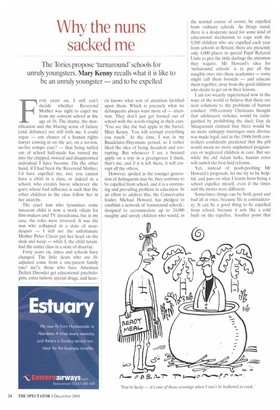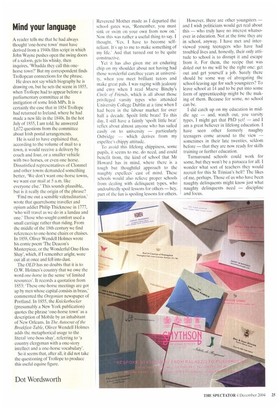Why the nuns sacked me
The Tories propose 'turnaround' schools for unruly youngsters. Mary Kenny recalls what it is like to be an unruly youngster — and to be expelled Forty years on, I still can't decide whether Reverend Mother was right to expel me from my convent school at the age of 16. The shame, the mortification and the blazing sense of failure (and defiance) are still with me. I could argue — any chance of a human rights lawyer coming in on the act, on a no-win, no-fee compo case? — that being turfed Out of school half-made has turned me into the chipped, twisted and disappointed individual I have become. On the other hand, if I had been the Reverend Mother, I'd have expelled me, too: you cannot have a child in a class, or indeed in a school, who creates havoc wherever she goes; whose bad influence is such that the other children in the class follow her in her anarchy.
The cruel nun who tyrannises some innocent child is now a stock villain for film-makers and TV docudrama, but in my case, the roles were reversed. It was the nun who collapsed in a state of neardespair — I still see the unfortunate Mother Peter Claver put her head on the desk and weep — while I, the child tyrant, had the entire class in a state of disarray.
Forty years on, times and schools have changed. The little dears who are illadjusted come from a one-parent family (me! me!): those who have Attention Deficit Disorder get educational psychologists, extra tuition, special drugs, and heav en knows what sort of attention lavished upon them. Which is precisely what we delinquents always want more of — attention. They don't just get booted out of school with the words ringing in their ears: 'You are like the bad apple in the barrel, Mary Kenny. You will corrupt everything you touch.' At the time, I was in my Baudelaire-Huysmans period. so I rather liked the idea of being decadent and corrupting. But whenever I see a bruised apple on a tray in a greengrocer I think, that's me, and if it is left there, it will corrupt all the others.
However, spoiled as the younger generation of delinquents may be, they continue to be expelled from school, and it is a continuing and prevailing problem in education. In an effort to address this, the Conservative leader, Michael Howard, has pledged to establish a network of 'turnaround schools', designed to accommodate up to 24,000 naughty and unruly children who would, in the normal course of events, be expelled from ordinary schools. As things stand, there is a desperate need for some kind of educational mechanism to cope with the 9,500 children who are expelled each year from schools in Britain; there are presently only 4,000 places in special Pupil Referral Units to give the little darlings the attention they require. Mr Howard's idea for 'turnaround schools' is to put all the naughty ones into these academies — some might call them borstals — and educate them together, away from the good children who desire to get on in their lessons.
I am too wearily experienced now in the ways of the world to believe that there are neat solutions to the problems of human conduct: 19th-century Christians thought that adolescent violence would be extinguished by prohibiting the duel; Guy de Maupassant claimed that there would be no more unhappy marriages once divorce was made legal; and in the 1960s birth controllers confidently predicted that the pill would mean no more unplanned pregnancies or neglected children in care. But no: while the old Adam lurks, human error will outwit the best-laid reforms.
Yet, instead of pooh-poohing Mr Howard's proposals, let me try to be helpful, and pass on what I learnt from being a school expellee myself, even if the times and the mores were different.
Sometimes things can be both good and bad all at once, because life is contradictory. It can be a good thing to be expelled from school, because it acts like a cold bath on the expellee. Another point that Reverend Mother made as I departed the school gates was, 'Remember, you must sink or swim on your own from now on.' Now this was rather a useful thing to say. I thought, 'Yes, I have to become selfreliant. It's up to me to make something of my life.' And that turned out to be quite constructive.
Yet it has also given me an enduring chip on my shoulder about not having had those wonderful carefree years at university, when you meet brilliant tutors and make great pals. I was raging with jealousy and envy when I read Maeve Binchy's Circle of Friends, which is all about those privileged varsity types who attended University College Dublin at a time when I had been in the labour market for over half a decade. Spoilt little brats! To this day, I still have a faintly 'spoilt little brat' reflex about almost anyone who has sailed easily on to university — particularly Oxbridge — which derives from my expellees chi ppy attitude.
To avoid this lifelong ehippiness, some pupils, it seems to me, do need, and could benefit from, the kind of school that Mr Howard has in mind, where there is a tough hut thoughtful approach to the naughty expellees' cast of mind. These schools would also relieve proper schools from dealing with delinquent types, who undoubtedly spoil lessons for others — hey, part of the fun is spoiling lessons for others. However, there arc other youngsters — and I wish politicians would get real about this — who truly have no interest whatsoever in education. Not at the time they are in school, anyway. I have met and interviewed young teenagers who have had troubled lives and, honestly, their only attitude to school is to disrupt it and escape from it For them, the recipe that was doled out to me will be the right one: get out and get yourself a job. Surely there should he some way of abrogating the school-leaving age for such youngsters? To leave school at 14 and to be put into some form of apprenticeship might be the making of them. Because for some, no school can be.
I did catch up on my education in middle age — and, watch out, you varsity types, I might get that PhD yet! — and I am a great believer in lifelong education. I have seen other formerly naughty teenagers come around to the view — sometimes in their late twenties, seldom before — that they are now ready for skills training or further education.
Turnaround schools could work for some, but they won't be a panacea for all. I wonder what sort of teachers they would recruit for this St Trinian's hell? The likes of me, perhaps. Those of us who have been naughty delinquents might know just what naughty delinquents need — discipline and focus.



















































































 Previous page
Previous page